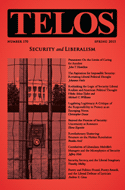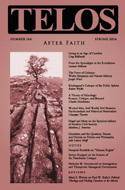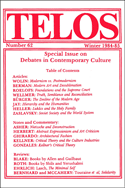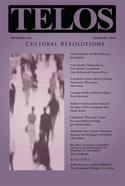By Timothy Melley · Tuesday, March 31, 2015
 Western societies increasingly imagine, plan, and even rehearse their own destruction. This cultural habit reflects a growing contradiction in democracy. On the one hand, liberal societies laud the ideals of participatory democracy, free speech, individual liberty, and governmental transparency. On the other, they grow ever more committed to the biopolitical regulation of life, the mitigation of threats to public health and safety, and the restriction of liberties as a way of securing liberty itself. How do we understand the inexorable growth of a security paradigm in liberal democracies? The answer lies partly in the cultural imaginary that shapes public contemplation of citizenship, liberty, and security. This imaginary reflects both the growing influence of biopolitics and the legacy the Cold War covert action. Paradoxically, the Cold War state’s growing commitment to covert action was itself increasingly public; as a result, public culture has became obsessed with, and enamored of, covert affairs. Despite state secrecy, most citizens believe they know the “kinds of things” their government is doing in secret—yet they cannot know in detail, and they receive most of their knowledge in the form of melodramatic fiction. The result is a growing irrationality in the democratic public sphere. Western societies increasingly imagine, plan, and even rehearse their own destruction. This cultural habit reflects a growing contradiction in democracy. On the one hand, liberal societies laud the ideals of participatory democracy, free speech, individual liberty, and governmental transparency. On the other, they grow ever more committed to the biopolitical regulation of life, the mitigation of threats to public health and safety, and the restriction of liberties as a way of securing liberty itself. How do we understand the inexorable growth of a security paradigm in liberal democracies? The answer lies partly in the cultural imaginary that shapes public contemplation of citizenship, liberty, and security. This imaginary reflects both the growing influence of biopolitics and the legacy the Cold War covert action. Paradoxically, the Cold War state’s growing commitment to covert action was itself increasingly public; as a result, public culture has became obsessed with, and enamored of, covert affairs. Despite state secrecy, most citizens believe they know the “kinds of things” their government is doing in secret—yet they cannot know in detail, and they receive most of their knowledge in the form of melodramatic fiction. The result is a growing irrationality in the democratic public sphere.
Continue reading →
By Telos Press · Wednesday, April 2, 2014 At this year’s Telos Conference in New York City, Telos Associate Editor Adrian Pabst outlined the theme of the upcoming Telos in Europe Conference, which will be held on September 5–8, in L’Aquila, Italy. This conference will focus on “The Idea of Europe,” and will offer speakers and attendees an opportunity to discuss Europe’s current crisis of identity. For complete details about the conference, as well as the full call for papers, please visit the conference page on the Telos Paul Piccone Institute website, located here.
Continue reading →
By Russell A. Berman · Wednesday, March 19, 2014 Telos 166 (Spring 2014) is now available for purchase in our store.
 According to the secularization thesis, religious faith should have long ago disappeared, overwhelmed by the forces of progress. Yet while explicit membership in denominational communities is certainly less an obligatory feature of contemporary culture than it was a generation or two ago, modes of religion still play important roles in aspects of social life. This issue of Telos explores some of the ramifications of this afterlife of faith. According to the secularization thesis, religious faith should have long ago disappeared, overwhelmed by the forces of progress. Yet while explicit membership in denominational communities is certainly less an obligatory feature of contemporary culture than it was a generation or two ago, modes of religion still play important roles in aspects of social life. This issue of Telos explores some of the ramifications of this afterlife of faith.
Continue reading →
By Beau Mullen · Wednesday, January 22, 2014 As an occasional feature on TELOSscope, we highlight a past Telos article whose critical insights continue to illuminate our thinking and challenge our assumptions. Today, Beau Mullen looks at Martin Jay’s “Hierarchy and the Humanities: The Radical Implications of a Conservative Idea” from Telos 62 (Winter 1984).
 The notion of “high culture” has been under attack in different ways by critics, academics, and the general public for generations. Moreover, as Western culture becomes increasingly commercialized, egalitarian impulses have exiled much of what was considered by many to be high culture to obscurity, appreciated mainly by a minority who are themselves regarded as cultural elitists. Popular or mass culture appears to now reign supreme, but this does not mean that cultural hierarchy has been brought to an end. Cultural hierarchy still has its defenders, and as Martin Jay suggests in his 1984 Telos article “Hierarchy and the Humanities: The Radical Implications of a Conservative Idea,” it clearly has a place in current cultural evaluations. The notion of “high culture” has been under attack in different ways by critics, academics, and the general public for generations. Moreover, as Western culture becomes increasingly commercialized, egalitarian impulses have exiled much of what was considered by many to be high culture to obscurity, appreciated mainly by a minority who are themselves regarded as cultural elitists. Popular or mass culture appears to now reign supreme, but this does not mean that cultural hierarchy has been brought to an end. Cultural hierarchy still has its defenders, and as Martin Jay suggests in his 1984 Telos article “Hierarchy and the Humanities: The Radical Implications of a Conservative Idea,” it clearly has a place in current cultural evaluations.
Continue reading →
By Jens-Martin Eriksen · Thursday, July 18, 2013 Jens-Martin Eriksen’s “Culturalism: When the Culture becomes Political Ideology” appears in Telos 163 (Summer 2013). Read the full version online at the Telos Online website, or purchase a print copy of the issue in our store. Eriksen and Stjernfelt’s The Democratic Contradictions of Multiculturalism is also available here.
 The political critique of modernity has gained momentum in Europe in recent years. It is a diverse movement, encompassing populist nationalist and national-conservative parties in Western Europe, a fascistoid Christian-nationalist revival—and on the opposite side: Islamism and the people they instrumentalize, the multiculturalists. They all agree that politics should focus primarily on culture and religion, and all other fields of operation depend on these aspects being stable and undisturbed and not influenced by other trends in society. The dogma that individuals from different groups should not mix is widely accepted and a de facto apartheid is more or less implemented in Western Europe by the civil society. The physical segregation in the cities and in public schools is a fact. The political power play is for the moment over signs and political symbols—e.g., the referendum in Switzerland about the prohibition of minarets, the ban on religions symbols in public schools in France, and other initiatives. The Left seems dazed and confused in this battle and unable to calibrate how to meet the challenge. The political critique of modernity has gained momentum in Europe in recent years. It is a diverse movement, encompassing populist nationalist and national-conservative parties in Western Europe, a fascistoid Christian-nationalist revival—and on the opposite side: Islamism and the people they instrumentalize, the multiculturalists. They all agree that politics should focus primarily on culture and religion, and all other fields of operation depend on these aspects being stable and undisturbed and not influenced by other trends in society. The dogma that individuals from different groups should not mix is widely accepted and a de facto apartheid is more or less implemented in Western Europe by the civil society. The physical segregation in the cities and in public schools is a fact. The political power play is for the moment over signs and political symbols—e.g., the referendum in Switzerland about the prohibition of minarets, the ban on religions symbols in public schools in France, and other initiatives. The Left seems dazed and confused in this battle and unable to calibrate how to meet the challenge.
Continue reading →
By Russell A. Berman · Monday, June 24, 2013 Telos 163 (Summer 2013) is now available for purchase in our store.
 Profound change in society may involve shifting control of political power, the character of economic systems, or access to resources, but it can also have to do with the structures of meaning we bundle together in various understandings of culture. This issue of Telos looks at the explosive forces located specifically in the intangible dimensions of culture and how they may play out in revolutionary or counter-revolutionary processes. Profound change in society may involve shifting control of political power, the character of economic systems, or access to resources, but it can also have to do with the structures of meaning we bundle together in various understandings of culture. This issue of Telos looks at the explosive forces located specifically in the intangible dimensions of culture and how they may play out in revolutionary or counter-revolutionary processes.
Continue reading →
|
|
 Western societies increasingly imagine, plan, and even rehearse their own destruction. This cultural habit reflects a growing contradiction in democracy. On the one hand, liberal societies laud the ideals of participatory democracy, free speech, individual liberty, and governmental transparency. On the other, they grow ever more committed to the biopolitical regulation of life, the mitigation of threats to public health and safety, and the restriction of liberties as a way of securing liberty itself. How do we understand the inexorable growth of a security paradigm in liberal democracies? The answer lies partly in the cultural imaginary that shapes public contemplation of citizenship, liberty, and security. This imaginary reflects both the growing influence of biopolitics and the legacy the Cold War covert action. Paradoxically, the Cold War state’s growing commitment to covert action was itself increasingly public; as a result, public culture has became obsessed with, and enamored of, covert affairs. Despite state secrecy, most citizens believe they know the “kinds of things” their government is doing in secret—yet they cannot know in detail, and they receive most of their knowledge in the form of melodramatic fiction. The result is a growing irrationality in the democratic public sphere.
Western societies increasingly imagine, plan, and even rehearse their own destruction. This cultural habit reflects a growing contradiction in democracy. On the one hand, liberal societies laud the ideals of participatory democracy, free speech, individual liberty, and governmental transparency. On the other, they grow ever more committed to the biopolitical regulation of life, the mitigation of threats to public health and safety, and the restriction of liberties as a way of securing liberty itself. How do we understand the inexorable growth of a security paradigm in liberal democracies? The answer lies partly in the cultural imaginary that shapes public contemplation of citizenship, liberty, and security. This imaginary reflects both the growing influence of biopolitics and the legacy the Cold War covert action. Paradoxically, the Cold War state’s growing commitment to covert action was itself increasingly public; as a result, public culture has became obsessed with, and enamored of, covert affairs. Despite state secrecy, most citizens believe they know the “kinds of things” their government is doing in secret—yet they cannot know in detail, and they receive most of their knowledge in the form of melodramatic fiction. The result is a growing irrationality in the democratic public sphere.  According to the secularization thesis, religious faith should have long ago disappeared, overwhelmed by the forces of progress. Yet while explicit membership in denominational communities is certainly less an obligatory feature of contemporary culture than it was a generation or two ago, modes of religion still play important roles in aspects of social life. This issue of Telos explores some of the ramifications of this afterlife of faith.
According to the secularization thesis, religious faith should have long ago disappeared, overwhelmed by the forces of progress. Yet while explicit membership in denominational communities is certainly less an obligatory feature of contemporary culture than it was a generation or two ago, modes of religion still play important roles in aspects of social life. This issue of Telos explores some of the ramifications of this afterlife of faith.  The notion of “high culture” has been under attack in different ways by critics, academics, and the general public for generations. Moreover, as Western culture becomes increasingly commercialized, egalitarian impulses have exiled much of what was considered by many to be high culture to obscurity, appreciated mainly by a minority who are themselves regarded as cultural elitists. Popular or mass culture appears to now reign supreme, but this does not mean that cultural hierarchy has been brought to an end. Cultural hierarchy still has its defenders, and as Martin Jay suggests in his 1984 Telos article “Hierarchy and the Humanities: The Radical Implications of a Conservative Idea,” it clearly has a place in current cultural evaluations.
The notion of “high culture” has been under attack in different ways by critics, academics, and the general public for generations. Moreover, as Western culture becomes increasingly commercialized, egalitarian impulses have exiled much of what was considered by many to be high culture to obscurity, appreciated mainly by a minority who are themselves regarded as cultural elitists. Popular or mass culture appears to now reign supreme, but this does not mean that cultural hierarchy has been brought to an end. Cultural hierarchy still has its defenders, and as Martin Jay suggests in his 1984 Telos article “Hierarchy and the Humanities: The Radical Implications of a Conservative Idea,” it clearly has a place in current cultural evaluations.  The political critique of modernity has gained momentum in Europe in recent years. It is a diverse movement, encompassing populist nationalist and national-conservative parties in Western Europe, a fascistoid Christian-nationalist revival—and on the opposite side: Islamism and the people they instrumentalize, the multiculturalists. They all agree that politics should focus primarily on culture and religion, and all other fields of operation depend on these aspects being stable and undisturbed and not influenced by other trends in society. The dogma that individuals from different groups should not mix is widely accepted and a de facto apartheid is more or less implemented in Western Europe by the civil society. The physical segregation in the cities and in public schools is a fact. The political power play is for the moment over signs and political symbols—e.g., the referendum in Switzerland about the prohibition of minarets, the ban on religions symbols in public schools in France, and other initiatives. The Left seems dazed and confused in this battle and unable to calibrate how to meet the challenge.
The political critique of modernity has gained momentum in Europe in recent years. It is a diverse movement, encompassing populist nationalist and national-conservative parties in Western Europe, a fascistoid Christian-nationalist revival—and on the opposite side: Islamism and the people they instrumentalize, the multiculturalists. They all agree that politics should focus primarily on culture and religion, and all other fields of operation depend on these aspects being stable and undisturbed and not influenced by other trends in society. The dogma that individuals from different groups should not mix is widely accepted and a de facto apartheid is more or less implemented in Western Europe by the civil society. The physical segregation in the cities and in public schools is a fact. The political power play is for the moment over signs and political symbols—e.g., the referendum in Switzerland about the prohibition of minarets, the ban on religions symbols in public schools in France, and other initiatives. The Left seems dazed and confused in this battle and unable to calibrate how to meet the challenge. 






